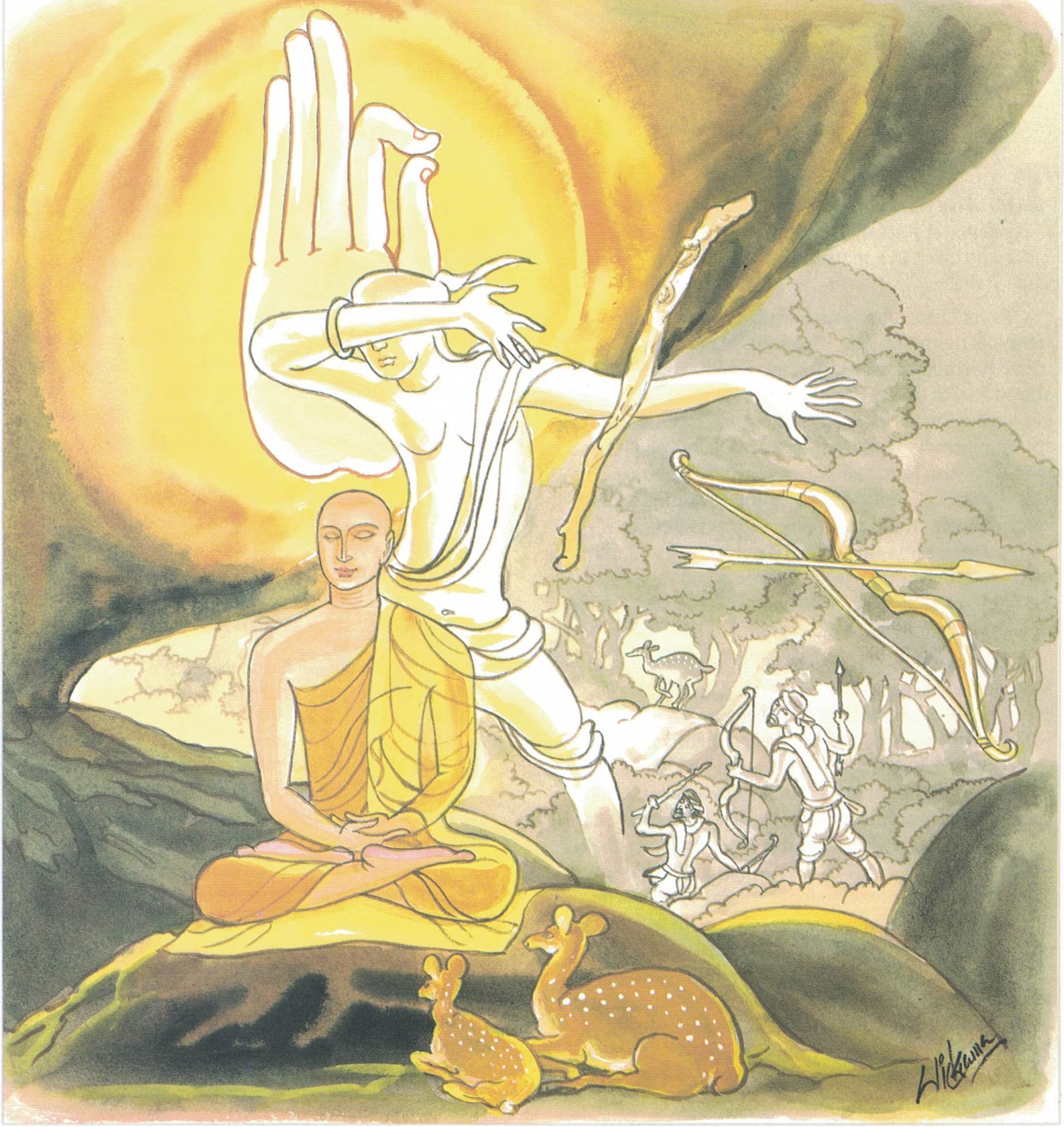Dhammapada (Illustrated)
by Ven. Weagoda Sarada Maha Thero | 1993 | 341,201 words | ISBN-10: 9810049382 | ISBN-13: 9789810049386
This page describes The Story of the Monk and the Woman which is verse 405 of the English translation of the Dhammapada which forms a part of the Sutta Pitaka of the Buddhist canon of literature. Presenting the fundamental basics of the Buddhist way of life, the Dhammapada is a collection of 423 stanzas. This verse 405 is part of the Brāhmaṇa Vagga (The Brāhmaṇa) and the moral of the story is “Shunning the rod he neither harasses nor kills. Him I call a brahmin true”.
Verse 405 - The Story of the Monk and the Woman
Pali text, illustration and English translation of Dhammapada verse 405:
nidhāya daṇḍaṃ bhūtesu tasesu thāvaresu ca |
yo na hanti na ghāteti tamahaṃ brūmi brāhmaṇaṃ || 405 ||
405. Who blows to beings has renounced to trembling ones, to bold, who causes not to kill nor kills that one I call a Brahmin True.
 Shunning the rod he neither harasses nor kills. Him I call a brahmin true. |
The Story of the Monk and the Woman
This verse was spoken by the Buddha while He was in residence at Jetavana, with reference to a certain monk.
It appears that this monk, upon receiving a meditation topic from the Buddha, retired to the forest, applied himself diligently to the practice of meditation, and attained arahatship. Thereupon he said to himself, “I will inform the Buddha of the great blessing which I have received,” and set out from the forest. Now a woman living in a certain village through which he passed, had just had a quarrel with her husband, and as soon as her husband was out of the house, said to herself, “I will return to the house of my family.” So saying, she set out on the road. As she went along the road, she saw the Venerable. “I’ll keep not far from this Venerable,” thought she, and followed close behind him. The Venerable never looked at her at all.
When her husband returned home and saw his wife nowhere about the house, he concluded to himself, “She must have gone to the village where her family lives,” and followed after her. When he saw her, he thought to himself, “It cannot be that this woman would enter this forest all by herself; in whose company is she going? “All of a sudden he saw the Venerable. Thought he, “This monk must have taken her away with him,” and went up to the monk and threatened him. Said the woman, “This good monk never so much as looked at me or spoke to me; do not say anything to him.” Her husband replied, to you mean to tell me that you took yourself off in this fashion? I will treat him as you alone deserve to be treated.” And in a burst of rage, out of hatred for the woman, he beat the Venerable soundly, and having so done, took the woman with him and returned home.
The Venerable’s whole body was covered with weals. After his return to the monastery the monks who rubbed his body noticed the weals and asked him, “What does this mean?” He told them the whole story. Then the monks asked him, “Brother, but when this fellow struck you thus, what did you say? or did you get angry?” “No, brethren, I did not get angry.” Thereupon the monks went to the Buddha and reported the matter to Him, saying, “Venerable, when we asked this monk, ‘Did you get angry?’ he replied, ‘No, brethren, I did not get angry.’ He does not speak the truth, he utters falsehood.” The Buddha listened to what they had to say and then replied, “Monks, they that have rid themselves of the evil passions have laid aside the rod; even for those that strike them, they cherish no anger.”
Explanatory Translation (Verse 405)
yo tasesu thāvaresu ca bhūtesu daṇḍaṃ nidhāya
na hanti na ghāteti taṃ ahaṃ brāhmaṇaṃ brūmi
yo: if some one; tasesu: that become frightened; thāvaresu: that are stubborn and unfrightened; ca: or; bhūtesu: beings; daṇḍaṃ [daṇḍa]: the rod; nidhāya: having set aside; na hanti: does not hurt; na ghāteti: or does not get anyone else to hurt or to kill; taṃ: him; ahaṃ: I; brāhmaṇaṃ [brāhmaṇa]: a true brāhmin; brūmi: I call
He has discarded the rod and set aside weapons. He hurts neither the frightened, timid beings, nor stubborn, fearless beings. I call that person a brāhmaṇa.
Commentary and exegetical material (Verse 405)
tasesu: Those who tremble in fear and those who are in trepidation due to fright brought about by craving.
thāvaresu: Those who are firm, stable and unshaken, since they have given up craving.
